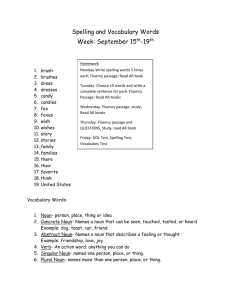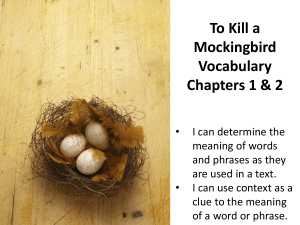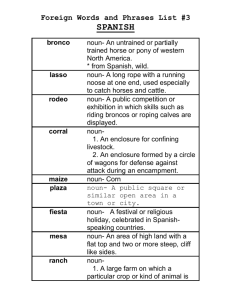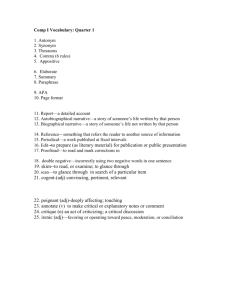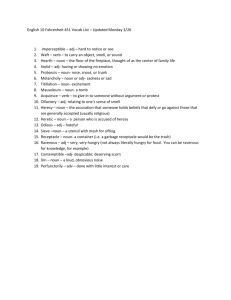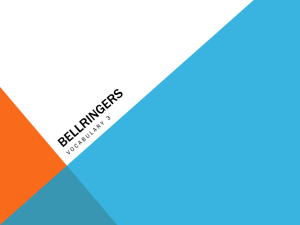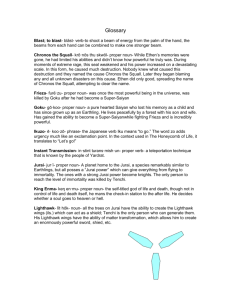Vocabulary matching WWII _1
advertisement
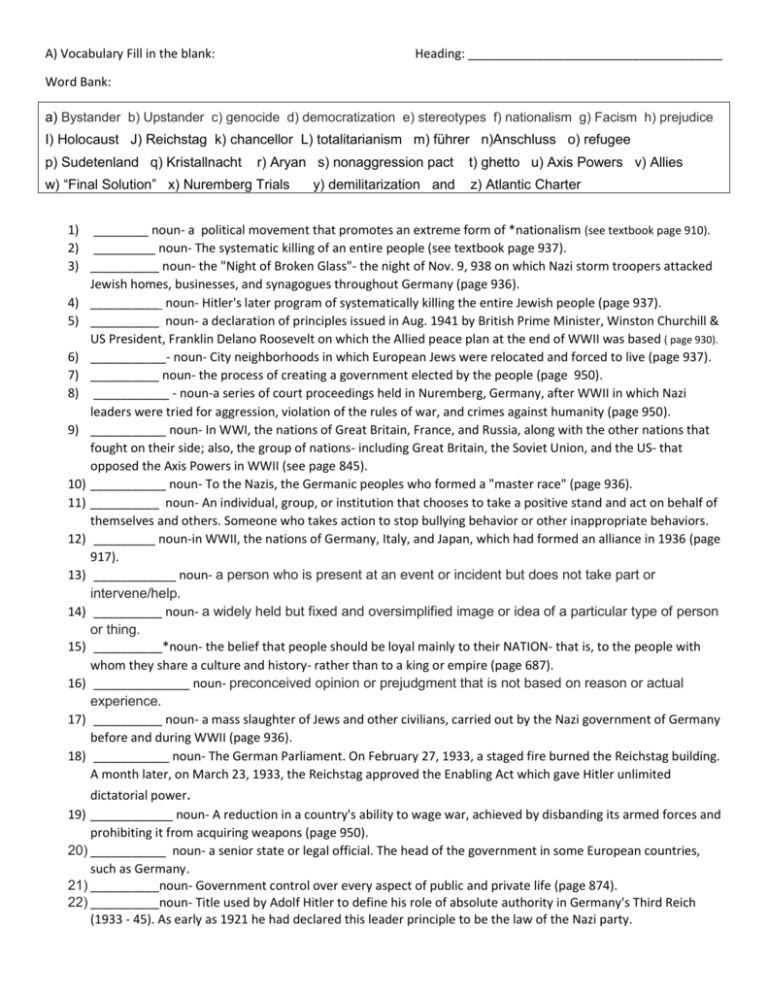
A) Vocabulary Fill in the blank: Heading: _____________________________________ Word Bank: a) Bystander b) Upstander c) genocide d) democratization e) stereotypes f) nationalism g) Facism h) prejudice I) Holocaust J) Reichstag k) chancellor L) totalitarianism m) führer n)Anschluss o) refugee p) Sudetenland q) Kristallnacht r) Aryan s) nonaggression pact w) “Final Solution” x) Nuremberg Trials y) demilitarization and t) ghetto u) Axis Powers v) Allies z) Atlantic Charter 1) ________ noun- a political movement that promotes an extreme form of *nationalism (see textbook page 910). 2) _________ noun- The systematic killing of an entire people (see textbook page 937). 3) __________ noun- the "Night of Broken Glass"- the night of Nov. 9, 938 on which Nazi storm troopers attacked Jewish homes, businesses, and synagogues throughout Germany (page 936). 4) __________ noun- Hitler's later program of systematically killing the entire Jewish people (page 937). 5) __________ noun- a declaration of principles issued in Aug. 1941 by British Prime Minister, Winston Churchill & US President, Franklin Delano Roosevelt on which the Allied peace plan at the end of WWII was based ( page 930). 6) ___________- noun- City neighborhoods in which European Jews were relocated and forced to live (page 937). 7) __________ noun- the process of creating a government elected by the people (page 950). 8) ___________ - noun-a series of court proceedings held in Nuremberg, Germany, after WWII in which Nazi leaders were tried for aggression, violation of the rules of war, and crimes against humanity (page 950). 9) ___________ noun- In WWI, the nations of Great Britain, France, and Russia, along with the other nations that fought on their side; also, the group of nations- including Great Britain, the Soviet Union, and the US- that opposed the Axis Powers in WWII (see page 845). 10) ___________ noun- To the Nazis, the Germanic peoples who formed a "master race" (page 936). 11) __________ noun- An individual, group, or institution that chooses to take a positive stand and act on behalf of themselves and others. Someone who takes action to stop bullying behavior or other inappropriate behaviors. 12) _________ noun-in WWII, the nations of Germany, Italy, and Japan, which had formed an alliance in 1936 (page 917). 13) ____________ noun- a person who is present at an event or incident but does not take part or intervene/help. 14) __________ noun- a widely held but fixed and oversimplified image or idea of a particular type of person or thing. 15) __________*noun- the belief that people should be loyal mainly to their NATION- that is, to the people with whom they share a culture and history- rather than to a king or empire (page 687). 16) ______________ noun- preconceived opinion or prejudgment that is not based on reason or actual experience. 17) __________ noun- a mass slaughter of Jews and other civilians, carried out by the Nazi government of Germany before and during WWII (page 936). 18) ___________ noun- The German Parliament. On February 27, 1933, a staged fire burned the Reichstag building. A month later, on March 23, 1933, the Reichstag approved the Enabling Act which gave Hitler unlimited dictatorial power. 19) ____________ noun- A reduction in a country's ability to wage war, achieved by disbanding its armed forces and prohibiting it from acquiring weapons (page 950). 20) ___________ noun- a senior state or legal official. The head of the government in some European countries, such as Germany. 21) __________noun- Government control over every aspect of public and private life (page 874). 22) __________noun- Title used by Adolf Hitler to define his role of absolute authority in Germany's Third Reich (1933 - 45). As early as 1921 he had declared this leader principle to be the law of the Nazi party. 23) ____________ noun-German annexation (connection)- was the unification of Austria by Nazi Germany in March 1938. Union, especially the union of Austria with Germany in 1938. 24) ______________ noun- a person who has been forced to leave their country in order to escape war, persecution, or natural disaster. 25) __________noun- A mountainous region in the N. Czech Republic, annexed (add to one's territory by occupation of conquest) by Germany in 1938; returned to Czechoslovakia in 1945 after WWII. 26) ______________ noun- An agreement in which nations promise not to attack one another (i.e. Germany and Russia agreed to this secretly along with agreeing to split/divide Poland [page 925]) . B) Three Part Vocabulary work- Due June 8, 2015 DIRECTIONS: 1a) Copy the definition (from above), 1b) use the word in an original sentences to show that you understand the meaning of the word (underline the vocab. terms in your sentences), and 1c) finally create a picture or use symbols to visually represent the meaning of the word/ term. Definitions are only worth 33% of your grade on this assignment. Consistently number each part of the work for each word (1a, 1b, 1c; 2a, 2b, 2c, etc. in order to keep the work plus picture for each word neatly together on your paper. Use extra paper and attach. Note: If done digitally you still need to print off/turn in a hard copy me and cite the exact source for "borrowed" visuals. c) Samples: Part A) Key term + Definition (part of speech) Part B) Word used in a sentence (underline the term in the sentences that you create) 1a) Upstander- noun- 1b) An individual, group, or institution that chooses to take a positive stand and act on behalf of themselves and others. Someone who takes action to stop bullying behavior or other inappropriate behaviors. 2a) Holocaust- noun- I am inspired to intervene and help the underdog by stories of Holocaust era upstanders such as the Sharps, Nicholas Winton, Varian Fry, Oskar Schindler, Miep Gies, and Lois Gunden (and many righteous others). A mass slaughter of Jews and other civilians (such as It is hard to believe that man could be so cruel to others and that the Holocaust atrocities were not stopped in time. I hope we learn from and never repeat this history. gypsies, the disabled, the mentally ill, Africans, homosexuals, political enemies, Catholics, Jehovah Witnesses etc.), carried out by the Nazi government before and during WWII. 2b) Part C) Picture, Symbol, Visual (cite the exact source of the visual if you "borrow" it from the web) 1c) Source: www.pinterest.com/projcornerstone/upstander/ 2c) Source: www.thecommentator.com/article/4595/holocaust_amnesia Vocabulary Fill in the blank: Heading: _______________________________________ Word Bank: a) Diaspora b)Triumvirate c) Consul d) Apostle e) Republic f) Aqueduct g) Patrician h) Inflation i) plebian j) Legion k) Mercenary l) Punic Wars m) Senate n) Pax Romana o) Greco-Roman Culture p) Civil War 1) Rebublic ________ noun- a form of government in which power is in the hands of representatives and leaders are elected by citizens who have the right to vote (see textbook page 156). 2) _________ Diaspora- The dispersal of the Jews (exile) from their homeland in Palestine, especially during the period of more than 1,800 years that followed the Romans’ destruction of their Temple in Jerusalem in A.D. 70 (see textbook page 170). 3) Patrician- __________ noun- in ancient Rome, a member of the wealthy, privileged upper class (page 156). 4) __________ Apostle- One of the followers (disciples) of Jesus of Nazareth who preached and spread Jesus’ teachings (see page 171). 5) __________ Inflation- noun A decline in the value of money, accompanied by a rise in the prices of goods and services (see page 173). 6) Plebian ___________- noun- in ancient Rome, one of the common farmers, artisans, and merchants. 7) __________ Mercenary- noun Constantinople (today called the city of Istanbul in Turkey)- This term is the former name of the capital, Byzantium. Along with the center of power shifting from Rome to here in the East, the city took this new name, Constantinople or city of Emperor Constantine. After his death the empire would be divided. This Eastern portion would survive but the west would fall. 8) Tribune ___________ - noun- in ancient Rome, an official elected by the plebeians to protect their rights (page 156). 9) ___________ noun Greco-Roman Culture- an ancient culture that developed from a blending of Greek, Hellenistic, and Roman cultures (see page 178). 10) Senate ___________ noun- in ancient Rome, the supreme governing body, originally made up only of aristocrats (the wealthy nobility). 11) __________ noun, A pipeline or channel built (esp. by Romans) to carry water to populated areas (see page 181). Aqueduct 12) Consul _________ noun- in the Roman republic, one of the two powerful officials elected each year to command the army and direct the government (page 157). 13) legion ____________ noun- a military unit of the ancient Roman army, made up of about 5,000 foot soldiers and a group of soldiers on horseback (page 157). 14) Punic Wars __________ noun- a series of three wars between Rome and Carthage (264 - 146 B.C.) which resulted in the destruction of Carthage and Rome's dominance over the western Mediterranean (page 158). 15) Dictator __________ noun- in ancient Rome, a political leader given absolute power to make laws and command the army for a limited time (see page 157). 16) Triumvirate ______________ noun- in ancient Rome, a group of three leaders sharing control of the government (page 161). 17) Civil War __________ noun- a conflict between two political groups within the same country (page 161). 18) Pax Romana ___________ noun- a period of peace and prosperity throughout the Roman Empire, lasting from 27 B.C. to 180 A.D. (starts with rule of Emperor Augustus- see page 162). Over------------) https://www.youtube.com/watch?v=xtoNUWOT8Cg An individual, group, or institution that chooses to take a positive stand and act on behalf of themselves and others. Someone who takes action to stop bullying behavior or other inappropriate behaviors.
